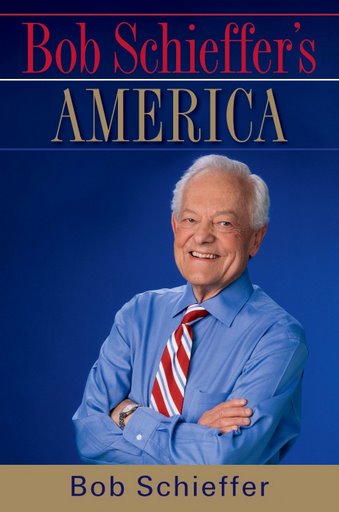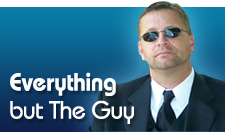In part one of the interview with CBS News luminary Bob Schieffer, the focus was his recent role as content cop (moderator) of the final McCain/Obama debate. In our discussion he proved to be the quintessential journalist – opinionated when appropriate, but objective, like his gathering and reporting of the news.
Now with just a few more days left for voters to debate “fo they ownself” … let’s take another look at the newsman’s book, Bob Schieffer’s America.

Schieffer has been “Johnny on the spot” at some of the true landmark events of the modern era. He has covered several presidents. Because of the debate frenzy in American politics this season, I asked Schieffer to look back on a president of the past. One who took a licking in his first bid for the Oval Office, suffering a defeat to John F. Kennedy – often attributed to pure aesthetics for the TV camera’s eye. Nixon.
President Nixon will forever be linked to crooked politics, despite (or perhaps because of) his most famous sound bite, “I am not a crook.” The names of scandals will end in “gate” from now on thanks to Watergate. But beyond that dark history, Nixon also ushered in one of the most significant cultural and business developments in this millennium.
“China is there! You have this enormous number of people and the notion that we were somehow going to pretend that they weren’t there, and that would not have any impact on our business around the world … or our fortunes around the world, was just absurd,” Schieffer said. “Nixon was very much ahead of public opinion at that time and very much ahead of his own party, in recognizing that we had to recognize China and deal with China.”
Reagan tore down a wall. Nixon scaled one, sending Coca-Cola to China 40 years ago, which of course led to us importing products ranging from toys with tainted paint, to seven-and-a-half-foot basketball players.
“That didn’t mean that they were going to be our best friends, but they had to be dealt with. … I think he deserves a lot of credit for that. I think he also deserves a lot of credit for the arms control work he did and the agreements he reached with the Soviet Union,” Schieffer said. “I mean after all we were living on earth at a time – for the first time – when man had a chance to actually destroy the planet he lived on, and he recognized that and put arms control on the front burner and he got a lot done.”
But, the jury on Nixon is in and his history recorded. But China will be a recurring theme for the next administration, Schieffer added, with ongoing trade issues, foreign policy, copyrights, intellectual property and security.
In addition to his career in media, which has jockeyed him from New York to Washington, D.C. and all over the world, Schieffer has deep roots in Texas. Surprisingly, most commentary prior to the debate ignored the fact that Tom Schieffer (his brother) had business dealings with President George W. Bush in the past. That few seemed to care speaks volumes for Bob Schieffer’s reputation and credibility.
So, let’s talk “W.”
In his book, Schieffer wrote of his initial support for the U.S. intervention in Iraq.
“Here’s the thing. When we thought Saddam Hussein had weapons of mass destruction, I thought we had no choice to disarm him,” Schieffer said. “And this was someone who had killed the husbands of his own daughters. He killed two of his daughters’ husbands … someone who had gassed his own people.
“This was a dangerous person, and it seemed to me if a person like that had a nuclear weapon it was only a matter of time until he used it. So I think, believing what we believed, that the President had no choice but to go in and disarm him. We now know that that was a false premise … that in fact it wasn’t true.”
Yes, years before George W. Bush took office, Saddam Hussein gassed his own people. So I suppose it depends on the definition of weapons of mass destruction. Or maybe we just called it a “hate crime,” since he targeted Kurd villages exclusively.
See: http://www.state.gov/r/pa/ei/rls/18714.htm
“My feelings is that it might have been cheaper and wiser in the long run to just keep him (Saddam Hussein) contained. But you know all of that’s ancient history,” Schieffer said. “We did it, and now we’re dealing with the consequences of that. ‘Is the world better off without him?’ I don’t think there’s any question about that.”
In the current election, one candidate is trying to distance himself from Bush and one is “trying to run against Bush.” How much can one presidency bear? In the book, Schieffer wrote that nothing could have prepared the president for 9-11. “So, welcome to the Oval Office.”
Schieffer said, “Certainly no president has had to deal with something like 9-11, but Franklin Roosevelt had to deal with Pearl Harbor … Eisenhower and Truman both had to deal with Korea. It’s not the first time that something bad has happened to this country. But, 9-11 was certainly the first time since the War of 1812 that there had been foreign soldiers on American soil. … Not foreign soldiers, but I mean foreign agents – terrorists – that did not wish us well.
“This was an attack on our homeland. Nobody had done anything like that, literally since the War of 1812. So this was something very new for this president to deal with,” he said.
Couple 9-11 with Katrina, a natural disaster that Schieffer compared to the San Francisco Earthquake and the Chicago Fire back in the 1800s, and the most recently add in Hurricane Ike who continues to tally damages and body count.
And then – for this interview, just as it is with the Bush presidency — time ran out. So, I didn’t get to ask Mr. Schieffer about surviving cancer … about interviewing the mother of the man who killed a U.S. president … about having a journalism school named after him … nor the URL for his favorite blog or anything about this mess called ACORN. And of course I still wonder if Bob Schieffer fires up the laptop at Starbucks.


